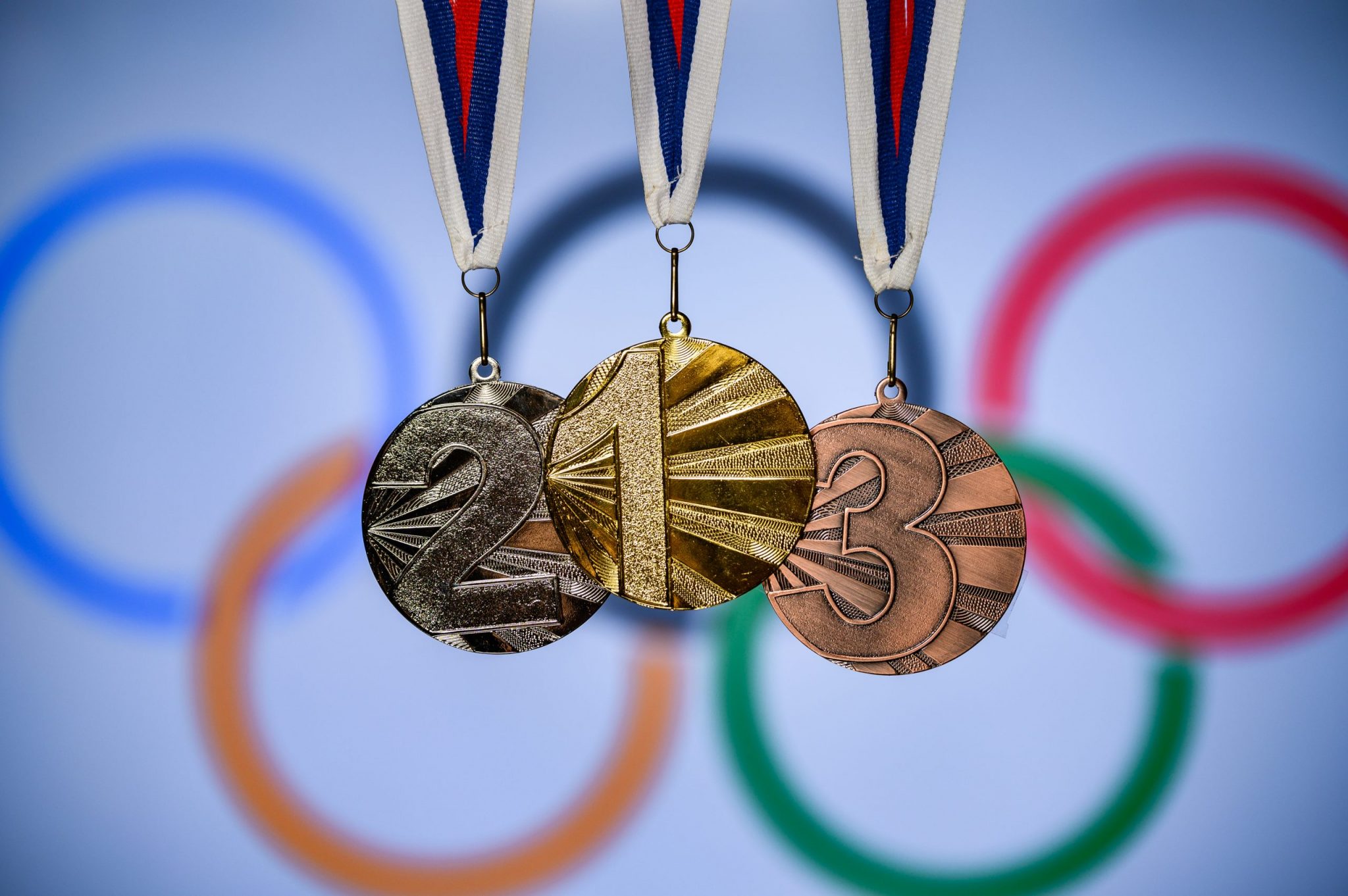Authoritarians have long used international sporting competitions as a platform for advancing political and geopolitical agendas, from using the successes of their athletes to boost national pride to opportunistically leveraging the global spotlight to promote state-backed propaganda. In a year when coronavirus measures have hyper-charged efforts to convince audiences at home and abroad of the superiority of authoritarian models of governance, it is unsurprising that Russian, Chinese, and Iranian government officials and state media outlets have used the Tokyo Olympics as an opportunity to showcase their respective strengths. Olympic-related themes have dominated the outputs of all three countries over the past two weeks (though Iran’s lack of success at the games has resulted in significantly less interest from Iranian messengers), accounting for nine of the ten most used hashtags and key phrases since the games began on July 23. Beyond championing the achievements of their respective athletes, messengers for each country have also waded into numerous controversies, many of their own making. This is particularly true of Russian diplomats and state media outlets, who have used Russia’s Olympic “ban” for its state-sponsored doping program as fodder for a particularly patriotic and aggressive messaging campaign (Russian athletes are competing under the Russian Olympic Committee “ROC” team name).
By the Numbers
Since the opening ceremony on July 23, the Tokyo Olympics have been the dominant topic for the collective Chinese, Russian, and Iranian Twitter networks monitored on Hamilton 2.0.
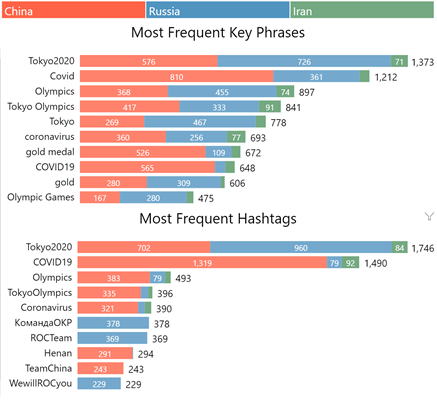
The most used key phrases and hashtags from Chinese, Russian, and Iranian accounts between July 23 and August 2, 2021.
Although each monitored country has used generic hashtags associated with the games (from example, #Tokyo2020), China and Russia have provided far more coverage of their respective teams than Iran, likely due to the fact that Iran has won only one medal compared to 62 medals for China and 50 for the ROC (as of August 2, 2021 at 12 p.m. ET). The discrepancy in coverage has been most notable when looking at diplomatic outputs, with Chinese and Russian official accounts celebrating the successes of their athletes. Russian diplomats were particularly vocal in their support, with Olympic-related hashtags—including the embrace of the ROC moniker with both Russian-language (#КомандаОКР) and English-language (#WeWillROCYou) hashtag campaigns—dominating their outputs. Although the most active accounts were, unsurprisingly, the official Russian Olympic Committee (@Olympic_Russia) and the Russian Embassy in Japan (@RusEmbassyJ), more than a dozen embassies from Sri Lanka to Ireland embraced the #WeWillROCYou campaign. Somewhat oddly, #TeamSerbia also was among the hashtags most used by monitored Russian accounts, though all uses appear to have come from the Sputnik Serbia Twitter account (@rs_sputnik) in a seemingly futile (based on engagement numbers) effort to drum up local interest in its Olympic coverage.
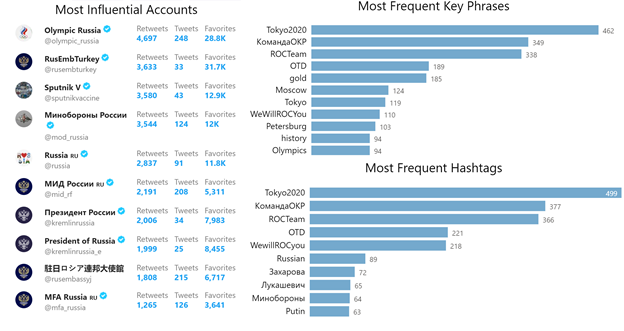
The most influential Russian diplomatic accounts and the most used key phrases and hashtags from those accounts between July 23 and August 2, 2021.
While diplomatic outputs generally focused on positive aspects of the games (with a few notable exceptions), state media outlets—Russia’s in particular—provided more critical coverage. Of the 19 Olympic-related RT and RT America videos captured over the past 30 days, roughly half were negative, including highlighting low television ratings, protests in Japan, and criticism of the “politicization” of the Games. Chinese state media coverage of the Games on CGTN and CGTN America’s YouTube channels was less negative, though roughly one-third focused on the safety of the Olympics due to the coronavirus.
What We’re Seeing on Hamilton 2.0
Russia
Due to Russia’s state-sponsored doping scandal, Russian athletes are competing at the Tokyo Olympics under the team name ROC (Russian Olympic Committee). Only the acronym is permitted in public displays, the Russian flag is banned, and a part of Tchaikovsky’s Piano Concerto No. 1 is being used for medal ceremonies in place of the Russian national anthem. However, as others have noted, announcements and broadcasters have been referring to the team as “Russia” or the “Russian Olympic Committee,” and the athletes have competed in uniforms prominently featuring the colors of the Russian flag.
A Ban in Name Only
Russian government officials have rarely acknowledged the ban, celebrating the successful performances of Russian athletes as usual. As noted, Russian diplomats (almost exclusively) have used the ROC moniker to create the hashtag #WeWillROCYou, while also at times overtly snubbing the ban by referring to the Team as the “Russian national team” or adding the hashtag #GoRussia to their posts.


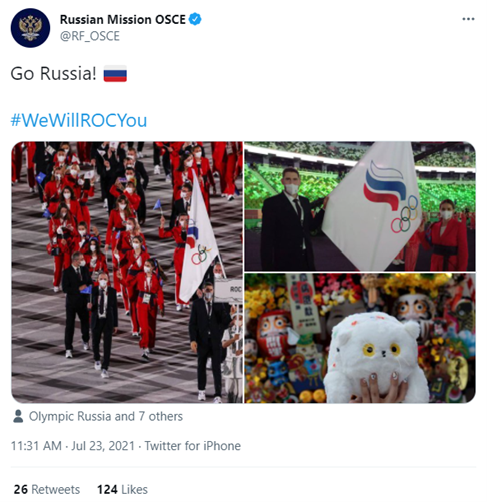
Examples of Russian government and diplomatic accounts combining the approved ROC moniker with messages referring to the Russian national team between July 23 and August 2, 2021.
When state media has mentioned Russia’s ban, it primarily has been used to paint athletes who criticize the presence of Russian competitors as “bitter,” sore losers, or “brainwashed,” as well as to elevate Russian tennis player Daniil Medvedev’s angry response to a reporter’s question about the scandal. In Russian language outputs, Foreign Ministry Spokesperson Maria Zakharova claimed that Russia’s successes at the games were causing a “real rage” among Western media, while the official Russian Olympic Committee account claimed that U.S. propaganda was being promoted by athletes “offended by defeat.”
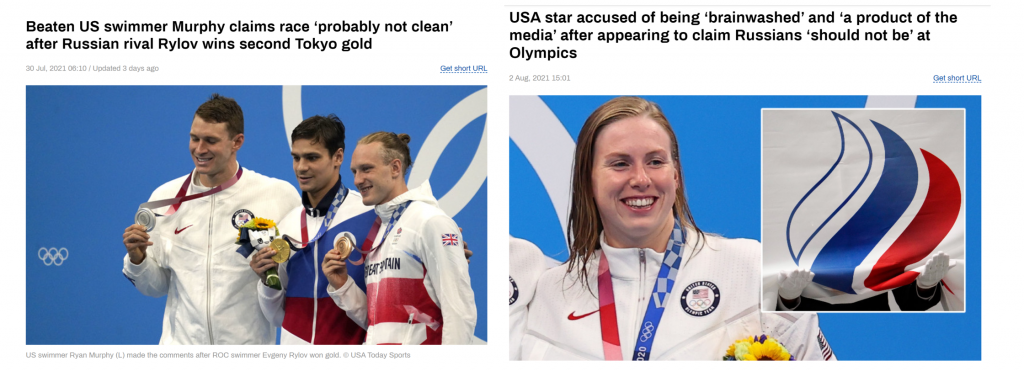
From left to right: RT “Beaten US swimmer Murphy claims race ‘probably not clean’ after Russian rival Rylov wins second Tokyo gold” (July 30, 2021) and RT “USA star accused of being ‘brainwashed’ and ‘a product of the media’ after appearing to claim Russians ‘should not be’ at Olympics” (August 2, 2021).
No Cheers for the Red, “Woke,” and Blue
Never missing an opportunity to pour accelerant on the U.S. culture war, RT’s opinion writers have also pushed the idea that the politicization of the Olympics—an event that typically unifies the U.S. political left and right—has made it impossible for most Americans to support Team USA. One op-ed writer blamed “lefty students [who] hate America” and refuse to root for Team USA, while another, American conservative pundit Wayne Dupree, proclaimed that he no longer supports Team USA and “actively hope[s] they lose” because of their “woke, anti-American activism.” Incongruity of those arguments aside, the two articles professed a similar disdain for “wokeness,” which has become a bête noire in Russian state media’s coverage of social justice movements in the United States.
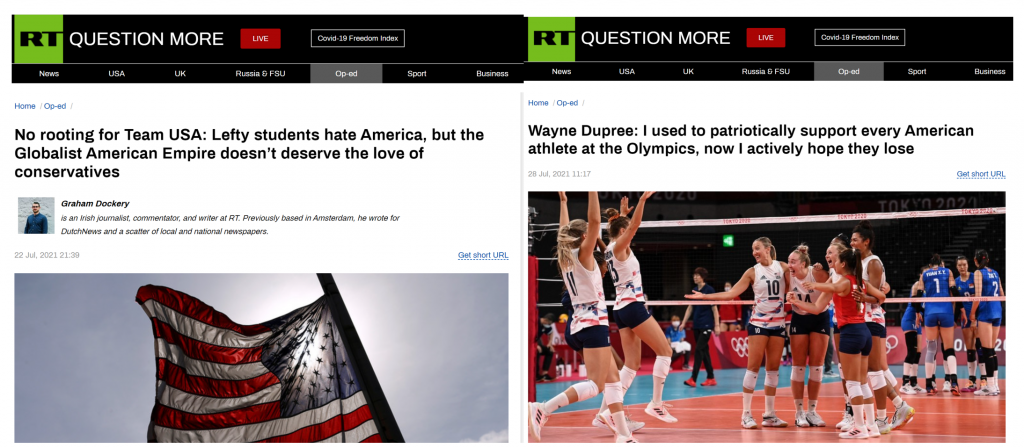
From left to right: Graham Dockery, RT, “No Rooting for Team USA: Lefty students hate America, but the Globalist American Empire doesn’t deserve the love of conservatives” (July 22, 2021) and Wayne Dupree, RT, “Wayne Dupree: I used to patriotically support every American athlete at the Olympics, now I actively hope they lose” (July 28, 2021).
Russian state media’s anti-woke coverage also took aim at individual athletes, singling out Japanese tennis star Naomi Osaka and American gymnast Simone Biles for their “woke weakness” while amplifying controversial takes about Biles’ withdrawal from the games (both athletes withdrew from recent competitions for mental health reasons). As is typical, RT also bashed the “mainstream” U.S. media for promoting “leftist” ideologies in its coverage, for its “unhinged attack on China’s Olympic success” (written by a frequent contributor to Chinese state media outlets), and for allegedly manipulating statistics to put the United States at the top of the medial count (The New York Times and most U.S. media outlets rank countries by total medals earned rather than gold medals).
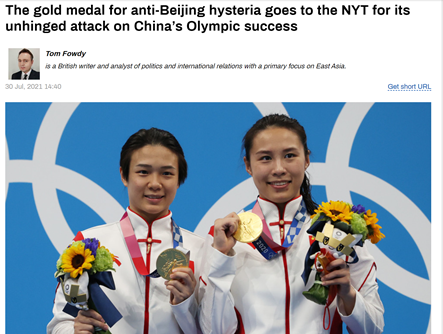
Tom Fowdy, RT, “The gold medal for anti-Beijing hysteria goes to the NYT for its unhinged attack on China’s Olympic success” (July 30, 2021). Fowdy is a frequent contributor to Chinese state media outlets.
China
Chinese diplomats and state-backed media accounts have trumpeted the successes of Chinese athletes, focusing primarily on celebration of China’s gold medal count. Some officials, however, have taken shots at the United States, seemingly arguing that the lack of U.S. dominance at this Olympics (the United States is second in gold medals and first in total medals as of August 2, 2021) was a sign of greater societal decline.
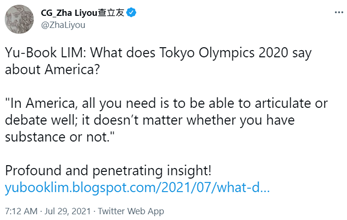
Tweet from Zha Liyou, Consul General of The Consulate General of China in Kolkata, India, criticizing Team USA’s performance at the Olympics (July 29, 2021).
Achievements of Ethnic Minorities and Nationals of Territories
Several official Chinese accounts have amplified messages pointing out that several athletes representing China are ethnic minorities as a not-so-subtle way of rebutting Western criticism over human rights abuses in Xinjiang and elsewhere. State media has also consistently highlighted the fact that Hong Kong is now a part of China when covering medals won by Hong Kong athletes, including celebrating the playing of the Chinese national anthem during the medal ceremony for Hong Kong’s Cheung Ka-long, the men’s individual foil winner.
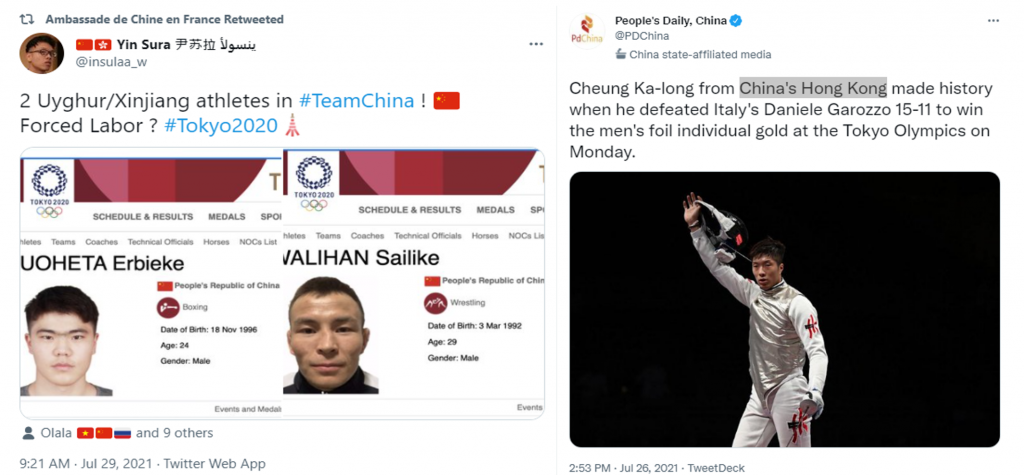
Retweet from the Chinese Embassy in France celebrating Uighur athletes (July 29, 2021) and People’s Daily, China, emphasizing China’s control of Hong Kong (July 26, 2021).
Western Media Bias
On July 24, the Chinese Embassy in Sri Lanka, amplified by the Global Times, attacked Reuters for allegedly intentionally selecting “ugly” photos of Chinese athletes while portraying beautiful “white westerners.” Some observers noted that Chinese state media outlets selected similar photos of Chinese athletes; however, the Chinese Embassy in Sri Lanka later implied that its complaint led Reuters to change its approach. Worryingly, this episode is part of a broader Chinese state-led effort to denigrate Western media outlets reporting on China, with a German reporter recently harassed while covering floods in Henan province.
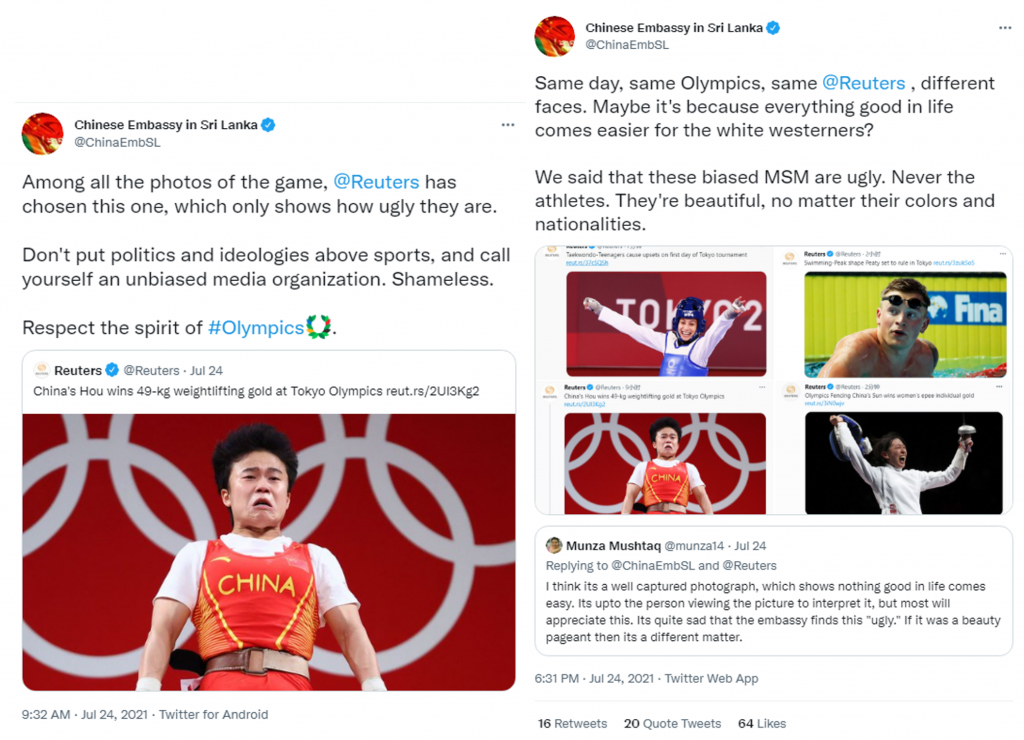
Tweets from the Chinese Embassy in Sri Lanka criticizing the photos selected by Reuters of Chinese athletes compared to “white westerners” (July 24, 2021).
Iran
Iran has provided significantly less coverage of the Olympics than Russia or China, likely due to its pedestrian performance to date. A substantial portion of its Olympic coverage has been devoted to Javad Foroughi, who took home gold in 10m Air Pistol, Iran’s first (and to date only) gold of the Tokyo Olympics and their first ever gold in a shooting sport. Foroughi is a nurse in the Islamic Revolutionary Guard Corps (IRGC) and appears to have served in Iraq and Syria. This makes him a particular point of pride for the regime in Tehran, but has also led to criticism from human rights advocacy organizations, among them United for Navid, which is named for Navid Afkari, an Iranian wrestler who was arrested, tortured, and ultimately executed by the regime. South Korean competitor and fellow marksman Jin Jong-oh wondered, “How can a terrorist win first place? That’s the most absurd and ridiculous thing.” Foroughi pushed back strongly, announcing that he does not forgive his critics, whom he accused of bias against Iran.

Tweet from Iranian state media Tasmin News amplifying gold medal winner Javad Foroughi’s pushback against criticism of his affiliation with the IRGC (July 26, 2021).
Another major subject of discussion among monitored accounts was the withdrawal of Algerian and Sudanese judokas from Olympic competition to avoid competing with an Israeli judoka. Some of this coverage was neutral; although, other pieces were celebratory and supportive. Iranian state media outlets also used the Olympics to emphasize solidarity between Iran and its neighbors, particularly Afghanistan.
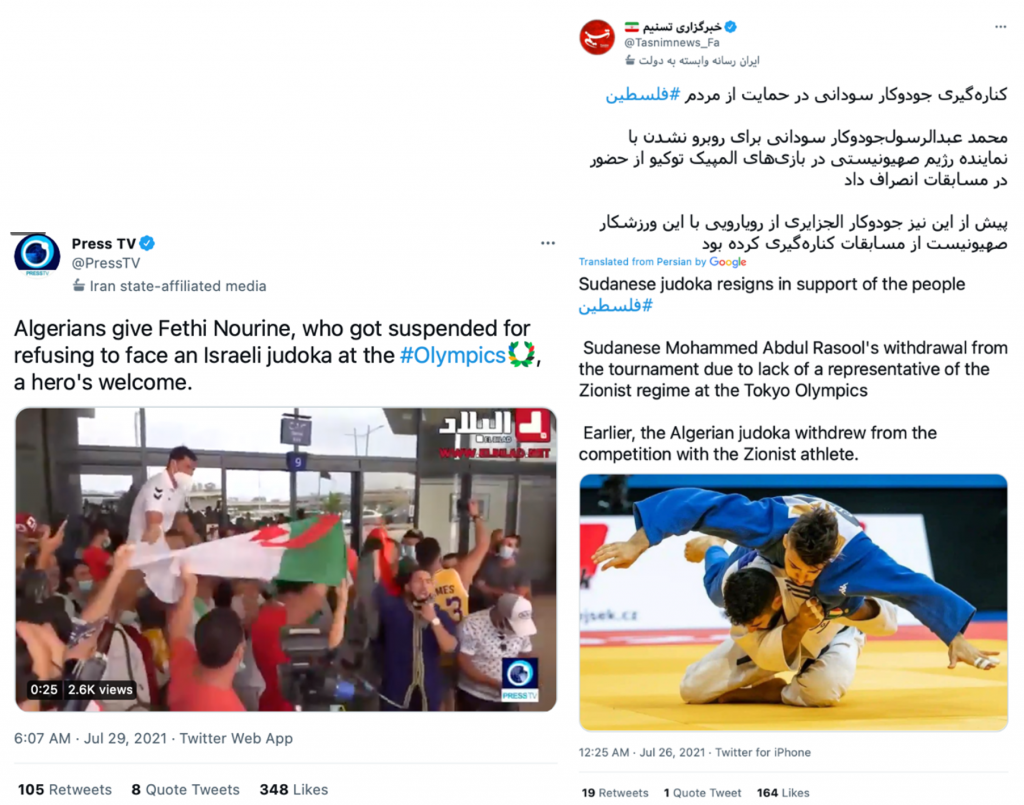
Tweet from Iranian state media outlets Press TV and Tasmin News covering the withdrawal and suspension of Algerian and Sudanese athletes for refusing to compete against Israeli athletes (July 29 and July 26, 2021).
Why It Matters
The 2020 Tokyo Olympics has provided a large stage for diplomats and state-affiliated media outlets to promote domestic and foreign achievements on a global stage. Predictably, medal counts have translated to interest in the games, with Iranian messengers producing far less content about the Olympics than their Russian and Chinese counterparts. Unsurprisingly, both Russia and China have celebrated the achievements of their athletes—though in the case of Russia, this is slightly more complicated given that the Russian Federation is technically not competing in Tokyo. Russian officials and state media’s celebration of ROC athletes has highlighted the farcical nature of the IOC’s ban, which has been treated less as a source of shame than a point of pride. But Russian state media’s coverage of the Olympics has once again shown a preference for denigrating Russia’s geopolitical competitors than boosting Russia’s image. Conversely, Chinese coverage has largely focused on using China’s successes to promote China’s rise and to portray confidence in the country’s overall trajectory. However, the Reuters episode has also betrayed an excessive sensitivity to any perceived slight to China’s greatness, as well as lingering resentment about the global reach of Western media.
The views expressed in GMF publications and commentary are the views of the author alone.

